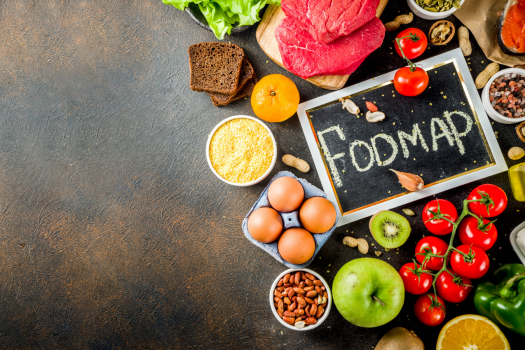During the FODMAPs and Athletes: Current Research and Strategies live webinar there were so many great questions that we could not get them all answered during the allotted time. Our presenter, Dr. Lauren Killian graciously provided her answers below for you.
Questions
How difficult is it for athletes to follow a low FODMAP diet, especially during training?
It may be very difficult for an athlete to follow the strict (Phase 1) low FODMAP diet during training and still ensure enough calories, carbohydrates, etc. to support high levels of training. It certainly can be done, but an athlete would need to carefully plan low FODMAP meals/snacks and ideally consult with a FODMAP-trained sports dietitian.
What happens when an athlete is not training – can they go off low FODMAP regimen?
If the athlete’s symptoms were primarily during exercise, then yes, they should be able to go off the low FODMAP regimen when not training. This would be a great way to reintroduce dietary variety.
Can you comment on sports foods (gels, chews, bars, etc.) and Low FODMAP options?
Our research indicated that many of the more popular choices of gels/gummies, solids, and beverages were high FODMAP, especially in multiple servings. That research is currently in review. I cannot comment directly on brands from that research, although the ingredients are listed in tables within that manuscript. The Monash University Low FODMAP App (a wonderful resource for clients and practitioners) is starting to include some sports nutrition products that have been certified low FODMAP. My hope is that as more awareness is brought to this area, more sports nutrition companies will formulate new certified products or have existing products certified. They would then be listed on the app.
Do recommendations differ for endurance athletes vs power athletes?
Research indicates that GI symptoms typically increase with exercise intensity and duration and are more prevalent in events with a running component. That is not to say that power athletes may not experience GI symptoms. If symptoms are experienced by power athletes during activity, then the low FODMAP approach(es) would typically be the same, although there is very little, if any, research in this area. Power athletes tend to have lower needs for nutrition during activity as well as generally less calorie and carbohydrate requirements compared to endurance athletes, so while low FODMAP strategies may be applied in both situations, they will probably look very different.
What are some low FODMAP foods you would recommend for the endurance athlete?
This really depends on the athlete’s individual FODMAP sensitivities and would be similar to foods recommended for any low FODMAP follower. Low FODMAP carbohydrate sources would be an important focus such as rice, brown rice pasta, quinoa, potatoes, some gluten-free or low FODMAP certified breads, etc. Luckily, protein sources like meat and eggs are naturally low FODMAP. Fruits and vegetables are obviously also important for micronutrients and berries, unripe bananas, grapes, many citrus fruits, carrots, red peppers, tomatoes, and many greens are low in FODMAP.
Do you think that some of the diarrhea that you see in the elderly could be the fodmaps as seen in the athletes?
I do not have much experience in this area, but it is certainly possible. Since its origination in the IBD/IBS area, FODMAP has definitely expended into many other areas. This would be an interesting study.
Have you seen athletes be able to improve tolerance to FODMAPs over time through gut training?
This is a great question. We have seen some positive results from some “gut training” regimens, particularly for nutrition consumed surrounding exercise. It is unclear how this gut training relates to actual FODMAP tolerance compared to the usual mechanism discussed in these studies (increased absorption capacity). There is less research in the FODMAP space on longer-term adapted low FODMAP diets, so it is unclear at this point how/if FODMAP sensitivities or tolerance change over time.
Can an athlete be “cured” of IBS and not need FODMAP indefinitely – will gut adapt and “heal” not requiring low fodmap
See the above response. Depending on the IBS, it can certainly improve or go away with time. FODMAPs are not the cause of IBS, they merely represent a nutritional strategy that can be used to reduce symptoms in around 60-70% of patients.
Why would we focus on a low FODMAP diet verses an elimination diet and agreed with the statement above to slowly add foods back in?
A low FODMAP diet is really a type of elimination diet focusing specifically on FODMAP sources. Either could be a valid approach in athletes, we have just seen recent evidence that indicates that a low FODMAP-style diet may be helpful. A food and symptom diary may be helpful in selecting which way to proceed.
What is considered a “low” FODMAP diet? vs. “no” FODMAP or “high” FODMAP?
A review by Tuck and Vanner (2018) proposed a cut-off point of 12g to be considered “low” FODMAP based on previous research which demonstrated symptomatic improvement at levels below 12g. Technically, that would mean anything above that is “high” FODMAP; however, most studies using a traditional or typical diet as a high FODMAP control use levels above 20g (i.e. 23, 28, 29g in various studies). “No” FODMAP is not really used or discussed in the literature as it would be extremely difficult to have a diet at this level.
This may be covered later, but did the research or do you have recommendations for fueling during endurance activities? Especially gels/chews.
Our research identified some lower FODMAP gels, which can again be seen in our future publication by looking at the ingredient lists. Some low FODMAP whole food sources or homemade products may be options (think purees/smoothies in gel flasks), depending on the type of activity. Ideally, sports nutrition companies would begin to develop or test existing products.
Where can we get a copy of your EAQ?
The EAQ is attached as a supplementary document on the validation article “Questionnaire on Irritable Bowel Syndrome and Symptom Management Among Endurance Athletes is Valid and Reliable” in Digestive Diseases and Sciences (2018) https://www.ncbi.nlm.nih.gov/pubmed/30232638 If you do not have access to that journal, feel free to reach out to me on ResearchGate or LinkedIn and I can send you the article.
Did you look at if there were differences between the elite and higher level athletes vs others? I am wondering if there might be a different in symptoms based on intensity – or is it more a difference in types of foods they consume? (Or maybe both?)
The competition level was explored in our research as a potential factor related to IBS presence (either diagnosed or meeting diagnostic criteria); however, we saw that gender was the only factor predicting IBS in our work (females had much higher prevalence). Previous research has certainly shown symptoms to increase with intensity and duration, so there is certainly the potential for higher-level athletes to experience more symptoms. However, these athletes also tend to pay more attention to things like their nutrition and severe symptoms may prevent athletes from competing at these high levels.
I know GI distress can be associated with anxiety that athletes are not aware of, how would you determine if it is due to a high FODMAP food, anxiety, or something else?
I think I answered this during our discussion, but to expand, it is potentially a combination of both of these factors, and then some. The anxiety may be a contributing factor (we know this is true with IBS) and then low FODMAP strategies represent a way to mitigate these symptoms.
Is the EAQ available as an online survey? What does the final score/value indicate?
It is not available as an online survey other than as a supplementary document to our publication (see above). It is an extensive questionnaire primarily meant for research purposes, so there is not really a final score/value that is indicative of anything. We assessed a wide range of areas of interest (current diet, training, symptoms, management strategies, etc.). The habitual FODMAP questionnaire (CNAQ) that I used is available as an online survey through Monash University (some fee attached) and provides output data on the total level of FODMAP broken down by FODMAP category.
Do you have a list you can provide of Low FODMAP fuel for endurance athletes?
See some answers above. Also, the article by Dr. Lis “Exit Gluten-Free and Enter Low FODMAPs: A Novel Dietary Strategy to Reduce Gastrointestinal Symptoms in Athletes” has an expanded table from what I reported during the webinar that provides some possible low FODMAP food exchanges for high FODMAP foods commonly consumed by athletes.
Can you share resources for training on FODMAPS? Please share resources as it relates to athletes. What sport nutrition specific resources/classes/certification are available for Sport RD’s?
Unfortunately, there are not currently many training programs/resources specifically for sports RD’s in relation to FODMAP. Current sports RD’s can benefit from general FODMAP training and applying it to their population. Some recommended resources are below.
- Monash University training on FODMAP and IBS for dietitians https://www.monashfodmap.com/online-training/dietitian-course/
- University of Michigan 3-day course Food: The Main Course to Digestive Health Note: Exact change each year, but similar content. I attended this course in 2016 and they included a discussion on athletes and FODMAP. Even if they do not specifically address it, many of the speakers are knowledgeable in this area if you want to discuss it. https://www.foodthemaincourse.com/index.php
- A good resource in general. Note: Some of the SN products they recommend but say “have not been tested yet” were actually included in our research but are not published yet. Also, products available in the US sometimes have different ingredients than the same product available in other countries. https://www.fodmapeveryday.com/how-to-fuel-when-you-have-ibs-all-about-low-fodmap-sport-gels-sport-drinks-snacks/
- Good tool, specifically for clients’ use http://www.myginutrition.com/fodmaps.html
Other places to look:
- Academy of Nutrition and Dietetics Food and Nutrition Conference and Expo (FNCE) often has sessions/research presentations on FODMAP
- Academy of Nutrition and Dietetics Sports, Cardiovascular and Wellness Nutrition (SCAN) DPG annual symposium
- American College of Sports Medicine (ACSM) Annual Meeting has had sessions related to athletes and GI issues/FODMAP in the past
Are the low FODMAP products labeled as such?
It depends. Some low FODMAP certification programs exist. For example, Monash University and FODMAP Friendly have started programs through which products can be analyzed and then certified as low FODMAP. This means that they continue to test these products over time, particularly if any ingredients, processing, sourcing have been changed. Once certified, products can carry a certification seal indicating a low FODMAP certification. Monash University certification information is also available on the Monash University Low FODMAP App.
Do you suggest multivitamins or micronutrient supplementation if high-fructose fruits and vegetables are being restricted in a low FODMAP diet?
It depends upon the individual’s specific sensitivities and the degree to which these fruits and vegetables were restricted, but yes, it is certainly something to assess an athlete’s diet for and potentially recommend.
Another resource, no longer available for CEU credit, but still great information on the FODMAP Diet is the recorded webinar: The low FODMAP diet for irritable bowel syndrome: From evidence to practice
Photo by Canva.













